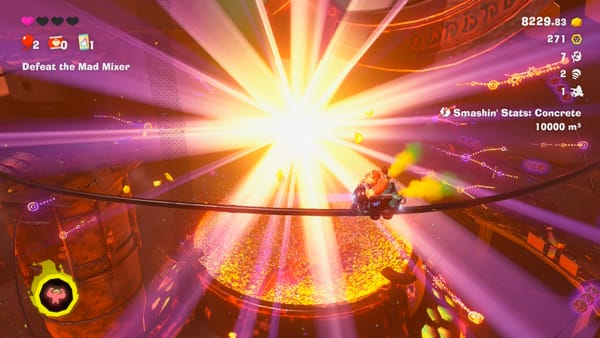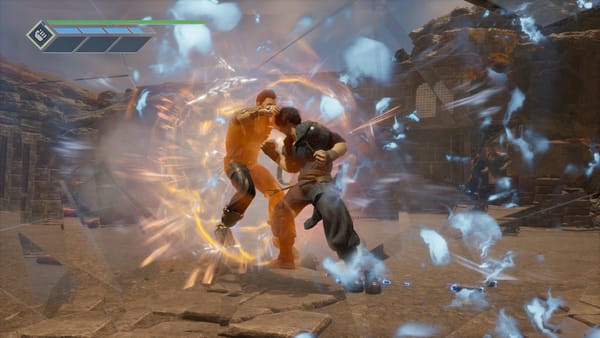109: Fall of Babylon
On what looks, really this time, like the final demise of E3.
[Thanks for reading Hit Points! If this is your first time, then a hearty welcome to you. If you enjoy today’s edition, note that you can sign up for free to get this thrice-weekly look at the latest goings on in the game industry sent straight to your inbox. It also gets you access to the full Hit Points archive. Thanks, and enjoy!]
One of my friend Andy’s first jobs was in a mobile phone shop. The music that played in-store was mandated by head office — something the company had either paid, or been paid, to have on rotation across their chain of outlets. Every month they’d send out a CD that had to be played, start to finish, on repeat, from the moment the lights went on in the morning until the shutters dropped at night. One month, the CD sent to Andy’s shop was badly scratched — so badly that only the first track would play. And so he spent a balmy summer month working for eight hours a day to the sound of David Gray’s ‘Babylon’, over and over and over again. Frankly it’s a miracle he survived to tell the tale. I’d have jumped off the roof by lunchtime.
I was reminded of that story last night while taking the temperature of some industry pals about the cancellation of this year’s digital not-E3, which follows the abandonment of a planned in-person event and feels, I fear, like the death knell for the show as a whole. This will be the third year in which the industry’s biggest traditional celebration has been absent from the calendar, and the third year in which Geoff Keighley has been given a clear run to further strengthen his cheerful stranglehold on the game-industry hype circuit. (He has, of course, already sashayed elegantly into shot, reminding everyone soon after the E3 cancellation was revealed that Summer Game Fest definitely still exists.) If I was Geoff I wouldn’t be sleeping until I’d got some kind of in-person event, however modest in scope, on the books for LA in June; just hop in E3’s grave, build something heavy on top of it, and make sure it can’t claw its way out again with a return to business as usual next year. One step closer to global domination for our Canadian friend.
Anyway! The Andy story. Few of the industry people in my DMs, WhatsApp and email inbox overnight are too upset about E3’s passing, and to be honest I can see why. For me the magic of E3 has very little to do with the show itself, except perhaps for the buzzy little shiver that you get the first time you walk through the doors of the LACC each year. It is about the press conferences that open the week; it is the dinners and drinks, the smoke breaks and quiet-corner gossip sessions with friends from around the global industry. The show itself is the point at which play turns to work, hype turns to exhaustion, and everything just sort of starts to smush together in an exhausting bundle of noise, handshakes and hangovers until you just want to go home and sleep for a week.
My E3 experience involves skittering desperately from one appointment to the next, invariably being five minutes late for everything regardless of however well I thought I’d planned my schedule, and beginning every meeting with what I hope is a disarmingly British apology but which I suspect makes me look like a hapless Mr Bean sort, rather than the suavely becalming Hugh Grant I was going for. For me, E3 is manic. For those in the industry, it is static, and wearyingly repetitive. It involves sitting, if you are lucky, in the same place for six hours a day, three days in a row; having the same meeting, showing the same presentation, or answering the same interview questions, over and over. The faces may change, but the song remains the same. E3 to them is, by and large, what Andy would call a Babylonian experience.
As such I can understand that the transition to a calendar full of Keighley-style, and often Keighley-helmed, direct-to-consumer livestream showcases comes as something of a relief to my friends in the industry. It is also a lot cheaper! Though I do think a note of caution here is necessary. I am biased, of course, but I think the role the press plays in the conversation between creators and consumers is often undervalued. I think a lot about Respawn’s Star Wars Jedi: Fallen Order, unveiled at the E3-adjacent EA Play in 2019 with a terribly dreary gameplay demo that cast it as a resolutely linear Uncharted knock-off with lightsabers. A day later I played it behind closed doors at E3, saw the reality was very different, and promptly put it on the cover of Edge. If all you show is a trailer then, absent any professional scrutiny, your audience will form their own opinions. And if you botch it as badly as EA did with Fallen Order — and there’s no press around to play it and go, hang on, this is pretty good! — then, well, good luck. Once a narrative is established, it is very difficult to change it.
I’ve written plenty before about my love of E3, and I admit that most of it is driven by selfishness. I love a week away in the sun, in a city I have grown to love, surrounded by friends and colleagues from around the world, talking about and playing these things that I adore and am lucky enough to have built a career around. Geoff Keighley is not going to give me any of that, obviously. But I also think it benefits the industry to be in direct competition for people’s eyeballs, and to have so much global attention focused on it for a week every year. E3 is bigger than the game industry: global news organisations report from the show floor, Miyamoto pops up in USA Today or Newsweek, and the mainstream press coos over Kanye or Spielberg or whichever A-lister is seen prowling the show floor. For one week every year the game industry comes together and flexes its muscles and everyone notices. That’s precious, I think, and important, even if being part of the show itself can be exhaustingly dull.
But look, I understand if few tears are being shed today over E3’s apparent demise. I suppose my developer friends have heard ‘Babylon’ enough by now, metaphorically speaking, and have earned themselves a break.
There was one E3 where Pharrell Williams’ song ‘Happy’ seemed to be everywhere. It was in at least one platform-holder press conference. I remember hearing it in the PlayStation demo room upstairs. And wherever I went on the show floor it seemed to be playing somewhere in the distance. The main culprit, it transpired, was Ubisoft. Every year its booth is built around the latest instalment in the Just Dance series: there’s a stage in the middle with costumed-up dancers performing from open to close, dancing to the same playlist of songs on an endless loop. ‘Happy’ was one of them.
On the final day of the show, I went to see The Division 2, and while waiting for my turn I saw a producer I knew from an earlier trip to Sweden to visit the game’s developer, Ubisoft Massive. He wore that dead-eyed gaze that everyone has on the last day of E3. I was wearing it too. Through my five-day hangover I managed to ask him how his show had been.
“It’s been fine,” he said. “The game’s going over really well. But after I get out of here, if I ever hear that ‘Happy’ song again, I’m going to fucking kill someone.”
So long then, E3. You were terrible, but we loved you all the same.
MORE!
- Four US senators — among them the former Democratic presidential hopefuls Bernie Sanders and Elizabeth Warren — have written to the Federal Trade Commission to express their concern at Microsoft’s proposed takeover of Activision Blizzard. The letter expresses frustration at CEO Bobby Kotick remaining in post until the deal completes, then receiving a hefty exit package, after overseeing a misconduct scandal that has rocked the game industry. “This lack of accountability, despite shareholders, employees, and the public calling for Kotick to be held responsible for the culture he created, would be an unacceptable result of the proposed Microsoft acquisition,” the group said.
- PlayStation has laid off over 90 staff across its sales and marketing departments in North America, as part of what Sony calls a “global transformation” of its business.
- Roblox Corp has sided with Apple in its antitrust dispute with Epic Games, praising Apple for how its app approval process “enhances safety and security, and provides those apps greater legitimacy in the eyes of users.” Roblox knows on which side its bread is buttered: Apple has essentially granted it an exemption to its policies prohibiting the sale of games within App Store apps. Epic had previously cited Roblox’s case as evidence of Apple breaking its own rules, arguing Epic and other developers should be allowed to do likewise.
- Capcom is to raise the base salary of workers in Japan by 30%, following a recent similar move by Bandai Namco. Capcom is in rude health: its recent Q3 earnings report was the best in the company’s history, and its forthcoming year-end results are expected to break profit records for the fifth year in a row.
- Kirby And The Forgotten Lands has had the best Japanese launch in series history, with 380,000 copies sold in its first week on shelves. I haven’t played it yet, but the eldest won’t shut up about it. Perhaps this weekend.
I do believe that’s your lot. As ever, if you’ve enjoyed this, do give it a share: it is the single most important thing you can do to help Hit Points to continue to grow, and therefore ensure its survival.
Earlier this week I took part in a group discussion on Substack, a regular thing in which writers swap tips and ask questions in a collective attempt to demystify a platform that we’re all sort of figuring out on the hoof. Someone asked why some writers number their posts, which is bad for SEO. I do that! And hoo boy, if you think my numbering is bad for SEO, you should see my headlines.
But that’s sort of the point. Part of the reason I was drawn to Substack was the way it marries the best elements of the web — its speed and immediacy, its potential reach — with the creative control, and blissful ignorance of search trends and analytics, that I enjoyed during my years in print. Sure, I could probably reach a few more eyeballs if I played the SEO game, getting rid of the numbering and stuffing my headlines and intros with keywords. But I rather like it this way, even if it does slow Hit Points down a bit. I said in my reply that “I'm far more interested in building a relationship with people through their email inbox, and relying on them to share it to help it grow, than I am in trying to please the algorithms.”
I hope that’s how it’s working for you, anyway. Unfortunately that means that readers sharing this thing around as much and as often as possible is incredibly important, which is why I have to keep asking. So, do us a favour, eh. And have an excellent weekend. Bye!





